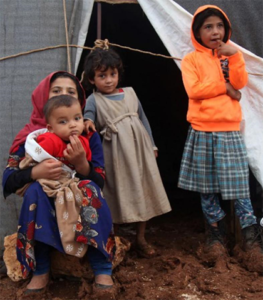Fighting flares again in Syria
 The conflict in north-western Syria has flared with Russian-backed Syrian government forces and Turkish-backed rebels engaging in unrestrained fighting that has put hundreds of thousands of civilians in danger.
The conflict in north-western Syria has flared with Russian-backed Syrian government forces and Turkish-backed rebels engaging in unrestrained fighting that has put hundreds of thousands of civilians in danger.
Syrian government and Russian forces are pushing into areas previously controlled by the rebels, using air bombardment, shelling, and ground forces.
Meanwhile, Turkey has equipped the array of Syrian rebel groups it backs with fresh supplies of weaponry to help them try to repel the assault.
Syrian President Bashar al-Assad launched an assault last month, saying rebels had breached an existing ceasefire, and triggering a civilian exodus by bombarding Idlib and adjacent areas.
It is the biggest escalation in fighting since last summer between Assad and his enemies in Idlib province and a belt of territory around it. It was being described as the last battle of the war in Syria.
But Turkey has stepped up supplies in recent days after failing to persuade Russia in meetings of a joint working group that it should end its escalation to avert a major influx of refugees pouring into Turkey.
Turkey has signalled its intention to maintain its influence in north-western Syria, where it has increased its troop presence at a dozen military bases that were set up under a de-escalation deal with Russia, reports say.
Meanwhile, human rights groups have slammed the use of Russian air-dropped incendiary weapons that have caused widespread civilian casualties.
A UN Security Council communique says that 22 clinics and hospital have been damaged and 270,000 civilians have had to flee.
“The humanitarian response to fighting in north-western Syria, including Idlib, is stretched and further military action will overwhelm all ability to respond,” the communique from the UN’s Assistant Secretary-General for Humanitarian Affairs warned.
Assistant Secretary-General Ursula Mueller, who is also Deputy Emergency Relief Coordinator, called on the 15-member body to take immediate action.
Ms Mueller said there was no doubt that Council members were aware of the tragic situation in Syria, where the conflict is now in its ninth year.
“The question today is what you will do to protect civilians in Idlib, the latest example of an entirely known, predictable and preventable humanitarian disaster unfolding before our eyes,” she said.
Ms Mueller said that in Idlib more than 160 confirmed civilian deaths had occurred along with the displacement of 270,000 people and attacks on health-care facilities, schools and markets.
Another 60,000 civilians will receive help in the coming days and weeks, in addition to the 1.2 million already being reached every month, she said.
Ms Mueller also expressed grave concerns about the situation in nearby Rukban, strongly urging Syrian authorities to grant permission for a third humanitarian convoy to the southern city.
She also spoke of the plight of 74,000 civilians at the Al Hol camp, 92 per cent of whom are women and children, and many of them foreigners, saying that solutions for such foreign nationals must be found urgently.
Laurie Nowell
AMES Australia Senior Journalist












